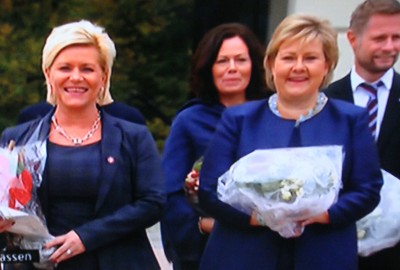Several of the most powerful positions in Norwegian society are currently held by women, but equality hasn’t fully extended to Norwegian business. As thousands of women prepared to march in International Women’s Day demonstrations on Sunday, new studies confirm that the battle for gender equality has not been won.

“Norway is often seen as a citadel of equality, known for its laws to get women on boards of directors,” Benja Stig Fagerland, an author who just published a book about the “Sheconomy” in Norway, told newspaper Aftenposten this week. “But foreigners can almost have a heart attack when they see how few female business leaders we have.”
Norway ranked surprisingly poorly in a new survey from the International Labour Organization (ILO). It offered an overview of female leaders at all levels in both the private and public sectors, and Norway ranked only 50th, way behind countries including the US, Iceland, Australia, Sweden, Canada and Great Britain. Jamaica topped the ILO survey for the sheer prevalence of women in private and public leadership positions, followed by Colombia and the Philippines. The US ranked 15th, Great Britain 41st.

A survey of Norwegian companies traded on the Oslo Stock Exchange reveals that none of the large companies has a female chief executive. The first woman to turn up as a CEO was at the exchange’s 62nd largest company in terms of revenues, the offshore firm Bonheur that’s controlled by the Fred Olsen family and led by Anette Olsen.
“Norway’s prime minister, finance minister, the head of (trade union federation) LO and the head of (employers’ organization) NHO are all women,” notes Berit Svendsen, who heads the Norwegian division of international telecoms firm Telenor. “That shows that we can lead. It’s a paradox that business hangs so far behind.”

Trade Minister Monica Mæland is also baffled by the lack of women in top management jobs. “It makes me wonder why,” Mæland told Aftenposten. “We have better programs for day care (and parental leave) than many countries, and are more able to hire in help, but still there are so few top women leaders.”
Some have suggested that many talented and highly educated women simply have other priorities than holding top jobs and earning high pay. Fagerland’s research showed that women control as much as 80 percent of household purchasing, and earlier media reports have chronicled how many women want to maintain control over laundry and other household chores, matter how much their husbands or partners try to help. It can be difficult to run both a big business and the “perfect” home, and some women opt for the latter, but Fagerland stressed to Aftenposten that women’s household purchasing alone indicates what an undervalued resource women can be in the workplace.
Svendsen, responsible for 4,000 employees at Telenor Norge, said she has help at home and that it’s fully possible “to have a family life and also be a top boss. You just have to organize your life a bit differently,” she told Aftenposten. Another study, however, showed that many Norwegian mothers still face discrimination by employers who worry that their children will distract them from their jobs.
Sunniva Ørstavik, Norway’s equality and discrimination ombud, conducted her own survey that showed half of all women questioned had experienced discrimination after they’d had children. Every fifth woman questioned opted against seeking new jobs when they were pregnant, because they thought they wouldn’t have a chance or would cause problems for their employer.
“This shows that there are still big equality problems in Norway,” Ørstavik told Aftenposten. “We think we are equal in this country … but 55 percent don’t get the jobs they seek when they have small children, the pay gap between men and women is widening, and women lose competence when they put their career on hold.”
Ørstavik wants to see tougher penalties against employers who violate Norwegian equality law. “We have to get employers and mothers to know what’s the law,” she said. “And employers must take responsibility. If they don’t follow the law, they should get punishment that hurts.”
newsinenglish.no/Nina Berglund

